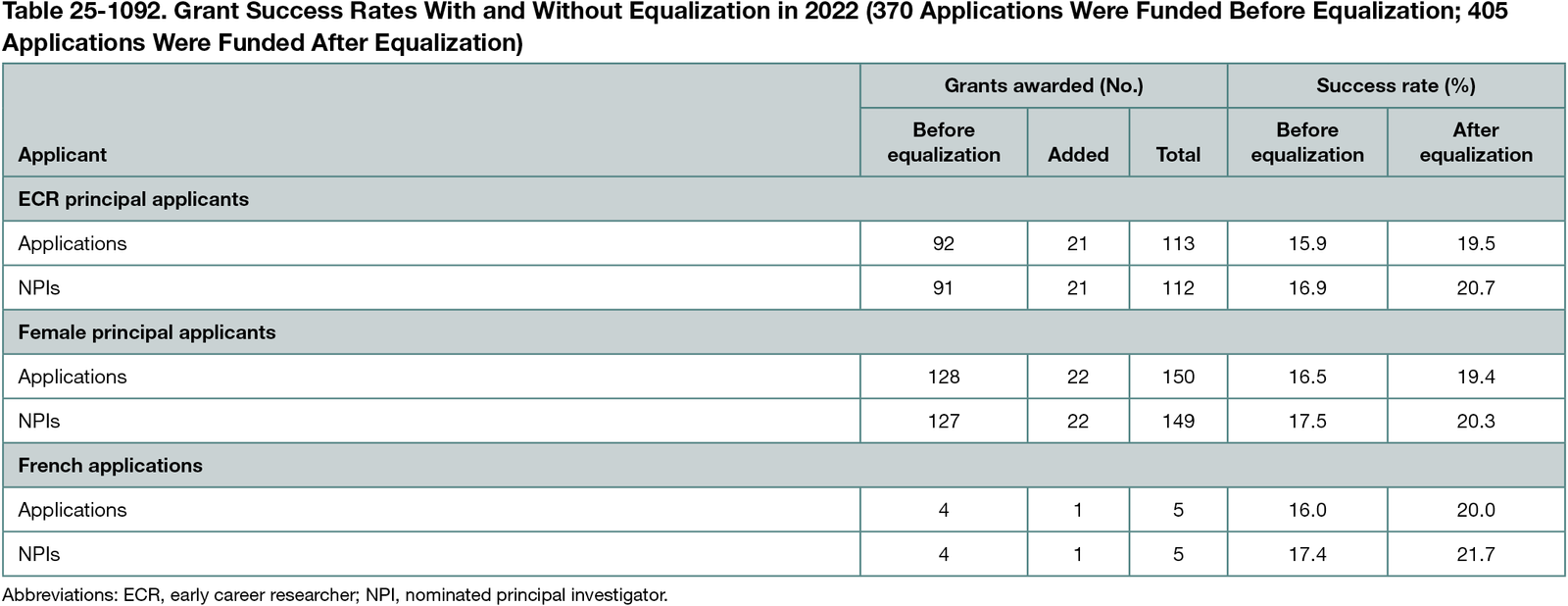Assessment of an Intervention to Equalize the Proportion of Funded Grant Applications for Underrepresented Groups at the Canadian Institutes of Health Research
Abstract
Anne Lasinsky,1 James Wrightson,2 Matthew Hogel,3 Alannah Brown,3 Adrian Mota,3 Karim M. Khan,1,2,4 Clare L. Ardern5,6
Objective
A small number of Canadian research funders have implemented interventions to address known biases in grant peer review. Equalization, which aims to match the proportion of funded grant applications to the proportion of submitted applications from specific underrepresented groups, is one such intervention. In 2016, the Canadian Institutes of Health Research (CIHR) implemented equalization for early career researcher (ECR) principal applicants in its Project Grant Competition. In 2021, equalization expanded to female principal applicants and French-language applicants. The objective of this study was to describe the outcome of equalization in 2022.
Design
This was a retrospective analysis of the number of funded grants in the spring 2022 CIHR Project Grant Competition. The equalization intervention was applied to applications submitted by ECR applicants, female principal applicants, and applications in French. To apply the intervention, first, scores for all applications submitted to the Project Grant Competition, which were reviewed by 59 committees, were converted to a percentage rank to account for scoring differences across committees. CIHR funded applications in rank order from the top percent rank, as far down as the competition budget allowed, and intervened to ensure that the next-ranked applications from each underrepresented applicant group were funded. Equalization matched the proportion of applications funded to the proportion of applications submitted by each group. No grants were defunded. Any grants that were equalized were added to the pool of funded grants—they did not displace another applicant’s score-win. This study descriptively analyzed routinely collected data from CIHR. The main outcome was the number of grant applications funded for each underrepresented applicant group, with and without equalization. The secondary outcome was the proportion of funded applications for each underrepresented applicant group, with and without equalization.
Results
There were 2095 applications submitted to the spring 2022 Project Grant Competition. Before equalization, 370 applications (17.7%) were funded. After equalization, 405 applications (19.3%) were funded with a total of CAD$325 million. ECR principal applicants submitted 580 applications (27.7%), female principal applicants submitted 774 applications (36.9%), and 25 applications (1.2%) were submitted in French). After equalization, 21 additional applications from ECR principal applicants and 22 applications from female principal applicants were funded (Table 25-1092). The funding success rates increased from 16.9% to 20.7% for ECR principal applicants and 17.5% to 20.3% for female principal applicants. One additional French-language application was funded with equalization; the success rate for French-language applicants increased from 17.4% to 21.7%.

Conclusions
In the spring 2022 CIHR Project Grant Competition, equalization increased the number of health research grants awarded and the funding success rate for ECR and female principal applicants, and for applications submitted in French.
Affiliations
1School of Kinesiology, The University of British Columbia, Vancouver, Canada; 2Department of Family Practice, The University of British Columbia, Vancouver, Canada; 3Canadian Institutes of Health Research, Ottawa, Canada; 4Canadian Institutes of Health Research-Institute of Musculoskeletal Health and Arthritis, Vancouver, Canada; 5Department of Physical Therapy, The University of British Columbia, Vancouver, Canada, clare.ardern@ ubc.ca; 6Sport and Exercise Medicine Research Centre, La Trobe University, Melbourne, Australia.
Conflict of Interest Disclosures
Matthew Hogel is Deputy Director, Funding Analytics at the Canadian Institutes of Health Research (CIHR). Alannah Brown is Senior Advisor to the Associate Vice-President at CIHR. Adrian Mota is Acting Vice President, Research—Programs at CIHR. Karim M. Khan is Scientific Director for CIHR’s Institute of Musculoskeletal Health and Arthritis (20172025). No other conflicts were reported.
Funding/Support
This work was supported by a CIHR Research Operating Grant (Scientific Directors) held by Karim M. Khan. CIHR’s Funding Analytics coordinated data management and analysis as part of its mandate to foster and deliver high quality peer review for health research in Canada.
Role of the Funder/Sponsor
CIHR did not participate in preparing the abstract, nor in the decision to submit the abstract for presentation.
